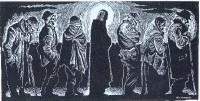| |
Why This Issue
Like the rest of us, I have listened to many of the comments made about the “illegals” that are supposedly flooding our country. They are often referred to as just that – “illegals” - not persons, but threats, invalidated by their very label. Politicians and others have bordered on hysteria in their call for tightening our borders, cracking down on lax employers, etc. I have wondered about all this animosity and hysteria. Where is this coming from?
Last fall I began participating in the “Intercambio” set up by IFCLA and facilitated by Elizabeth Driscoll. The idea was that Spanish speakers who wanted to learn English would pair up with English speakers who wanted to learn Spanish and we would take turns speaking with the other in the language each wanted to learn. I came to Kabat House to participate in this exchange. I have thoroughly enjoyed these sessions, and my Spanish has improved. The day we played “Dictionary” in Spanish was hilarious. However, even more valuable, these sessions with Spanish-speaking immigrants have opened my eyes to their realities. Each time I heard another story of immigration, I was deeply moved.
I heard about the trains people catch to come up north, and how sometimes they have to hold onto a ladder on the side of a train-car for more than 24 hours, not sleeping or eating, and that sometimes they can’t hold on and they fall off, slipping to their death under the moving train. I heard about stories of slavery here in St. Louis, of people who are sold to businesses and have no recourse. Some of the people telling me these stories had faces worn with the sun, bodies with the scent of hard work, and clothes of a working person – jeans, rumpled shirts. Are these the people who are inspiring so much fear and animosity?
Three summers ago, I traveled to El Salvador and visited the village of Guarjila. Immigration to the U.S. looks a lot different from down there than it does from up here. From the view up here, immigrants are looked upon as selfish opportunists, gleefully breaking the law to benefit themselves, taking advantage of our open society. From Guarjila, it felt more like an on-going tragedy that people had to leave their famlies and work in the U.S. to make enough to support their families. The families suffer greatly from the absense of spouses, parents, children, even if the money helps them to raise their standard of living. “If a spouse is gone for more than three years,” one Salvadoran told me, “the marriage usually doesn’t last.” Her own marriage hadn’t lasted; when her spouse sent for her to join him in the U.S., she opted to remain in Guarjila to work for change.
We are bringing you stories about immigration to the United States. Elizabeth Driscoll relates some of the personal struggles of immigrants that she has known. Jenny Truax fills us in on the history of immigration to the U.S. and causes for the current wave of newcomers. Carolyn Griffeth offers a theological reflection on how we ought to treat the stranger in our midst. Marilyn Lorenz-Weinkauf and Susan Ryan, of the Interfaith Committee on Latin America, tell us about the Latin American reality and the effects of immigration on Gurajila, the town that Marilyn has visited annually for the past 20 years or so. Sarah Cool, from Cherith Brook Catholic Worker House in Kansas City, Missouri, writes of the myths and realites of immigrants today.
As always, we include our regular columns: James Meinert, in "From Karen House" tells us the latest, John Nolan updates us on Kabat House, and Teka Childress takes up the issue of decentralization in "Catholic Worker Thought and Action."
We hope our efforts convey to you a bit more of the experiences of the men and women who struggle and sacrifice much to make a living in this country. And we hope you are inspired to welcome these ‘strangers in a strange land," in other words, our neighbors.
- Ellen Rehg
|
|


